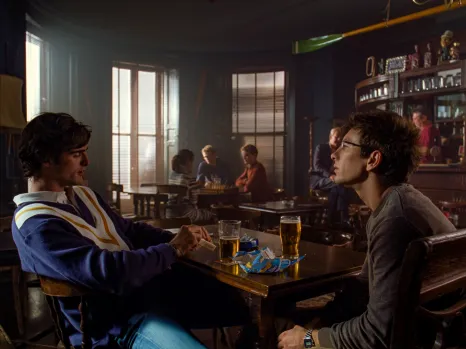
Emerald Fennell burst onto the scene of talented writer/directors with 2020’s Promising Young Woman and three years later, she makes her anticipated return to multiplexes. Saltburn begins on the campus of Oxford University with freshman student Oliver Quick (Barry Keoghan), an awkward, unpopular young man who comes from humble beginnings at school that caters to those who grew up under the exact opposite circumstances. Oliver soon befriends the popular, handsome and charming Felix Catton (Jacob Elordi), an aristocrat from the upper crust. Felix soon invites him to Saltburn, his eccentric family’s sprawling estate.
This film uses commentary on class stratification to not just examine differences in socioeconomic status, but also explore the very nature of envy within the human psyche. As the story develops onscreen, it is obvious that Oliver’s feelings toward Felix are obsessive, bordering on love and infatuation. At the film’s conclusion when Oliver’s motives are revealed, it may seem that love was not at the center of his decision-making with manipulation and greed instead being what drove him. What Saltburn’s story reveals however is how love, obsession, and hatred can become interwoven into a singular feeling, essentially what the emotion of envy is. Oliver both resented and coveted Felix and the Catton family’s station in life, hating them for having it yet admiring their wealth and wanting the same for himself simultaneously. Oliver, and his brilliant depiction by Keoghan, conveys the emotional complexity of an envious person effectively, blurring the lines between each individual feeling to the point where the audience can be unsure at times of what Oliver’s motives are. Does he want Felix for himself? Does he want to replace him? Does he want to join the Catton family? Envy contains multitudes and Oliver’s characterization encapsulates this point to the fullest. Despite the character being in Keoghan’s wheelhouse to the point of him feeling borderline typecast, he’s still able to bring something to the role that allows him to standout as a commanding star of the film rather than feeling rote and familiar. The complexity described above is pulled off perfectly in performance, hitting all of the necessary points between obsession, love, and sociopathy that bring Oliver to life.
The film isn’t without its statements on the culture of the upper class itself in addition to how those surrounding them feel. In the aftermath of a tragic event that befalls the Cattons, we are treated to an intense interaction between Oliver and family in the emotional wake of what happened. Set against an intensely red-tinged dark backdrop, we see how important it is for the upper crest to keep up the veneer of their dignified appearance despite whatever may be actually going on in their lives. The character of Farleigh being the only Catton to confront the matter at hand, and the only Catton who has experienced how the other half lives, accentuates the point of how detached the wealthy are from experiencing and dealing with real problems head on. This need to keep up appearances and avoid any discomfort or direct confrontation of problems plays a part in how Saltburn ultimately plays out for the Cattons and drives home a broader point about the wealthy themselves. As the story develops, we also come to learn that Felix has made a habit of “adopting” classmates from poorer backgrounds into his social circle, only to discard them later should they get to close to his family or simply when he becomes bored with them. As Oliver targets Felix and the Catton’s, Felix similarly targets his poorer classmates as novelties or curiosities, keeping them as play things until he can find another to bring into Saltburn to gawk in awe at him and his environment. That Felix similarly uses people as he and his family end up being used is a bit poetic and a statement of how the hunter can become the hunted, only in ways even worse than what the hunter had been guilty of.
Emerald Fennell has created a gothic tale of obsession and class stratification that may not say much new about class divides, but is beautifully shot and interesting enough to follow along with while being entertained. Aside from cinematography that is a feast for the eyes, Barry Keoghan’s performance powers the film and is the perfect, weird compliment to a film that takes chances at being offbeat and salacious within its script. Saltburn is a film that swings for the fences and while it may not hit a home run, it has its moments that make it an admirable second outing from Fennell.
Image: Amazon MGM Studios

